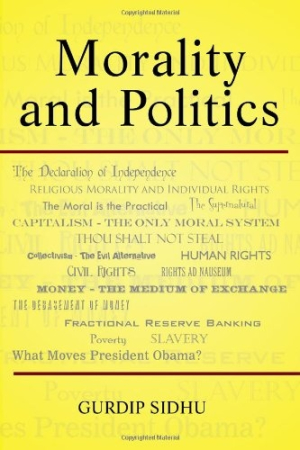
Morality and Politics
This exceptionally well-argued political treatise provides food for thought to both ends of the political spectrum.
Cautioning against what he perceives as America’s flirtation with socialism, Gurdip Sidhu’s concise, well-argued treatise, Morality and Politics, mounts a defense of capitalism and individual rights.
Morality and Politics makes a strong case that capitalism is the most moral political system because it takes into account two essential subjects: human self-interest and inherent rights. With a rigorously rational approach that makes extensive reference to America’s history and founding documents, Sidhu’s nonfiction debut is a persuasive proposal for harmonizing the title’s two sticky subjects. Even those who fundamentally disagree with the author’s conservative ideology should find plenty to ponder here.
Sidhu begins by refuting what is generally assumed to be a moral dilemma: capitalism is predicated on self-interest, whereas goodness is motivated by self-sacrifice. He maintains that, as beneficial as compassion is to society, the government cannot enforce self-sacrifice. Socialist redistribution of wealth, requiring citizens to relinquish hard-earned property for others’ benefit, is, he concludes, little more than “theft, Robin-Hood-style.”
Inspired by the Objectivist philosophy propounded by Ayn Rand, this book praises capitalism as the apogee of human achievement. The author discounts religion for its fundamental irrationality and incompatibility with capitalism and instead prioritizes some strong examples of capitalism’s place throughout American history. The Declaration of Independence charges the government with protecting individuals’ rights. Property rights are preeminent here; civil rights only form a subset in this book’s argument. Sidhu contends that group rights do not exist, because groups are just sets of individuals; moreover, talk of group rights creates the factionalism that fuels civil wars.
Throughout, Sidhu illuminates controversial issues with his clear, methodical prose. His arguments reflect both systematic thought and rhetorical skill. Even when his assertions seem hyperbolic (as when he declares money “man’s most moral invention”), it is difficult to find flaws with the logical steps that lead to such conclusions. In just ninety pages, the author covers a lot of intellectual ground. However, the book’s reasoning works best in the abstract, or as applied to historical events, but can seem less relevant when turned to practical affairs.
For instance, contempt for Obamacare is evident, though no viable alternatives are offered. Criticism of the president’s tactics comes in inflammatory rather than explanatory language—with terms like “callous disregard for the Constitution,” “no qualms about cheating,” and “telling the truth…for a change”—but lacks supporting evidence. A dense chapter on the history of slavery in America seems apposite only for providing an excuse to discuss the role of race in Obama’s election. There is a lack of cultural sensitivity in a statement like, “It doesn’t take a genius to infer that blacks voted for [Obama] because he is perceived by them as one of their own.”
The final section on current events appears strangely out-of-date in discussing the “upcoming” 2012 election. Although this book may be best suited to the tastes of Tea Party conservatives, it is a thought-provoking and largely convincing antisocialist tract that those from all sides of the political spectrum would benefit from reading.
Reviewed by
Rebecca Foster
Disclosure: This article is not an endorsement, but a review. The publisher of this book provided free copies of the book and paid a small fee to have their book reviewed by a professional reviewer. Foreword Reviews and Clarion Reviews make no guarantee that the publisher will receive a positive review. Foreword Magazine, Inc. is disclosing this in accordance with the Federal Trade Commission’s 16 CFR, Part 255.
